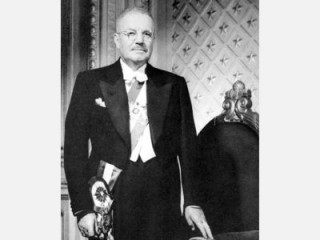
Carlos Ibanez Del Campo biography
Date of birth : 1877-11-03
Date of death : 1960-04-28
Birthplace : Linares, Chile
Nationality : Chilean
Category : Politics
Last modified : 2011-02-11
Credited as : Politician, former president of Chile, populist leader
Carlos Ibáñez del Campo was a Chilean general and twice president of the republic. A self-styled populist leader, he attempted to secure for the middle and lower classes a greater voice in the nation's economic and political life.
Carlos Ibáñez was born in Linares on Nov. 3, 1877. Entering the military school in Santiago, he graduated and received his commission. In 1903 he was appointed military adviser to the army of El Salvador, and after his return to Chile he held the directorship of the cavalry school and police academy. He rose to political prominence as a result of the military coup in September 1924 and was one of the leaders of the second coup of January 1925, which restored Arturo Alessandri, the legal president, to power. Ibáñez was rewarded by being named minister of war. He emerged as a spokesman for reformist-minded and politically ambitious officers and steadily increased his influence in the government.
Alessandri resigned after a clash with Ibáñez in October 1925, and the new president, Emiliano Figueroa Larrain, was forced to keep him in the Cabinet. Figueroa, a weak leader, was eventually eased out in April 1927, and Ibáñez was now the most powerful leader of the nation. Elections were called, and he was almost unanimously elected president. Ibáñez governed dictatorially, exiling his opponents and restricting citizens' rights. His dictatorship was popular, however, as Chile was enjoying prosperity, foreign loans were available, and the government instituted public works projects to keep employment at a high level.
Ibáñez's popularity declined when the effects of the world depression were felt in Chile, and in July 1931, after popular demonstrations broke out, he was forced to flee. His subsequent career centered on rehabilitating his image and attempting to regain power. He ran for the presidency in 1938 as the standard-bearer of the Nazis and in 1942 as the candidate of the conservatives and liberals. In 1949 he was elected to the Senate.
In 1952 Ibáñez organized his party, the Agrarian-Labor, and appealed to the electorate as an independent, not tied to the vested interests, one who could resolve the social and economic problems of the country. The traditional parties, split and discredited, accused Ibáñez of wishing to install a peronista - style dictatorship in Chile. But the voters expressed their desire for strong government and gave a plurality of votes to Ibáñez. Once in office, he found it difficult to govern. Congress was in the hands of his enemies, and he was old and unable to offer effective leadership. He served out his term increasingly powerless and in 1958 turned over the presidency to Jorge Allessandri, his elected successor. Ibáñez died on April 28, 1960.
There is no detailed study of Ibáñez's career in English. Federico G. Gil deals with Chile during the Ibáñez era in The Political System of Chile (1966). John Reese Stevenson covers the Ibáñez dictatorship in The Chilean Popular Front (1942), and Fredrick B. Pike ably discusses both administrations in Chile and the United States, 1880-1962 (1963).
















